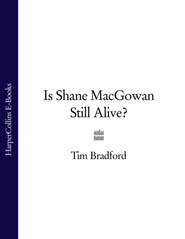
Полная версия:
Is Shane MacGowan Still Alive?

Is Shane MacGowan Still Alive?
TRAVELS IN IRISHRY

Tim Bradford

Copyright
The author and publishers are grateful to the following for permission to reproduce material: Kinky Music and R&E Music for permission to quote from ‘Before All Hell Breaks Loose’ by Kinky Friedman and Panama Red and ‘When the Lord Closes the Door (He Opens a Little Window)’ by Kinky Friedman and Jeff Shelby; Warner/Chappell Music for permission to quote from ‘Hit Me With Your Rhythm Stick’ by Ian Dury; BMG Music for ‘I Should Be So Lucky’ words and music by Mike Stock, Matt Aitken and Pete Waterman © BMG Music Publishing Ltd/Mike Stock Publishing Ltd/Sid’s Songs Ltd/All Boys Music Ltd (All rights reserved. Used by permission); Leeds United FC for permission to quote from The Leeds United Book of Football. Thanks to Pogue Music Ltd and Perfect Songs Ltd for permission to quote from ‘ A Rainy Night in Soho’ by Shane MacGowan.
Every reasonable effort has been made to contact copyright holders for all the extracts reproduced in this volume. The publishers apologise for any omissions and are happy to receive any emendations from copyright holders at the address below.
Fourth Estate
An imprint of HarperCollinsPublishers 1 London Bridge Street London SE1 9GF
www.harpercollins.co.uk
First published in Great Britain by HarperPress 2000
Copyright © Tim Bradford 2000
Tim Bradford asserts the moral right to be identified as the author of this work
All rights reserved under International and Pan-American Copyright Conventions. By payment of the required fees, you have been granted the nonexclusive, nontransferable right to access and read the text of this e-book on-screen. No part of this text may be reproduced, transmitted, downloaded, decompiled, reverse engineered, or stored in or introduced into any information storage and retrieval system, in any form or by any means, whether electronic or mechanical, now known or hereinafter invented, without the express written permission of HarperCollins e-books.
HarperCollinsPublishers has made every reasonable effort to ensure that any picture content and written content in this ebook has been included or removed in accordance with the contractual and technological constraints in operation at the time of publication.
Source ISBN: 9780006551683
Ebook Edition © FEBRUARY 2016 ISBN: 9780007394685
Version: 2016-01-13
Dedication
To the Irish people who
have changed my life
Epigraph
But Leeds taught me something else – that
work and will to win are just as vital as any
instinctive skills you may possess.
JOHNNY GILES, Leeds United Book of Football
Today I decided not to think of you
But was betrayed by a lazy pub window.
I saw a slim tree whose delicate red leaves
Rose and fell in the Thames breeze –
A mixed-up drinker, at this time of year,
I can taste Yeats in the beer.
ROBERT GAINSBOROUGH, ‘Maude Gone Fishing’
Contents
COVER
TITLE PAGE
COPYRIGHT
DEDICATION
EPIGRAPH
LIST OF ILLUSTRATIONS
PREFACE
Is Shane MacGowan Still Alive? Camden Town to Camden Lock
Irish Myths & Legends 1: How to be Irish
FINNEGANIA
On a Clear Day You Can See Fulham Football Ground Hammersmith
Irish Myths & Legends 2: Irish Food
VIKING TOWN
Visions of Beer and Loathing on the Road to Holyhead Hammersmith to Dublin
Notes on a Cultural Tour of Dublin
The Informal Urchin-gurrier Choir of Hill 16 Croke Park
Dublin, Fair City of Vikings, Buskers and Soaring House Prices Twenty-four quietish hours
Irish Myths & Legends 3: Leprechaun
ORANGE COUNTY
Hungover Adventures with the Sea-Urchin-Moustachioed Guard Kildare
A Cup of Tea, A Slice of Cake, I Love You Adare, County Limerick
Looking for an All-Encompassing Theory of the Universe in a Hurling Match Limerick to Thurles, County Tipperary
Why is there Orange in the Irish Flag? East to west Portarlington, County Laois
The Search for the Celts
Dunphy v. Charlton Football
Irish Myths & Legends 4: Some Ancient Sagas of Magical Creatures
SHANEWORLD
Lost Highway – County Cork
Fungie the Dolphin, Dingle, County Kerry
Is Irish Music Any Good? Doolin, County Clare
The Day the Earth Stood Still Limerick to Galway, County Clare
Conversations with the Future Foreign Correspondent of the Irish Times Galway City
Alone on Yeats’ Mountain Sligo to Benbulben round trip
W. B. Yeats v. Daniel O’Donnell Around Sligo
The Ian Paisley Impersonators Talk about Weapons Derry
Thinking in Four-part Harmony Mullingar to Moate
Irish Myths & Legends 5: Heritage Ireland
MARYLAND
Smelly Stuff, God, Moving Statues and Space Jockeys Ballinspittle, County Cork
The Art of the Storyteller Blarney,County Cork
Selling a Car in Potato Town Youghal, County Cork
The Beach Tramore, County Waterford
Born to be Wild (Now and Again, if I’m in the Mood) Ireland to Englishness
APPENDIX: London Irish pub guide
KEEP READING
IRISH CROSSWORD
HELPFUL IRISH MAPS
INDEX
SOLUTIONS
ACKNOWLEDGEMENTS
ABOUT THE AUTHOR
PRAISE
ABOUT THE PUBLISHER
List of Illustrations
1 Welcome to Ireland
2 ‘Ireland’
3 Atonal Improvised Alto Saxophone
4 Morris dancing v. Irish dancing
5 Leppy
6 FINNEGANIA
7 Various: potato, wine-man, half-crazed hawker
8 ‘Sure, so what’s this squiggly bit, then?’
9 My Great, Great Grandfather the Horseperson
10 Pseudo-Sean and his Joycean chat-up
11 A dancing ‘Gerry Adams’
12 Superquinn Sausages
13 English butter bad, Irish butter good
14 VIKING TOWN
15 Tim’s Short- and Long-Term Memory Tank System
16 Terry’s Short-Term Memory System
17 Electropop
18 The Great Lincolnshire Graphic Novel
19 Various: comedian, armoured car, mad relation
20 Holyhead
21 Cultural Tour Icons: Book of Kells, Martello Tower, Maud Gonne, Charlie Haughey, The Divorce Referendum, Gate Theatre, Sharon Shannon and Donal Lunny, The Peace Process, Ireland 1 Italy 0, Dana
22 Football Types
23 O’Shea’s
24 Mad Eyes
25 Scary Viking
26 Leprechaun, Firbolg
27 Jockey
28 ORANGE COUNTY
29 Barney the Cocktail Maker
30 Red-faced Beardy
31 Various: angry short speccy guy, ticket inspector (dead-ringer for a German U-boat commander), two Clare girls, old man
32 Hurling
33 Sean McCabe the barber
34 Yellow Steeple, Trim
35 Tara
36 The Celts were tough
37 Faery Footballer
38 Jack Charlton
39 Sean the Dublin Bay Prawn of Neutrality
40 Kevin the Carp of Storytelling
41 SHANEWORLD
42 Tractor/pheasant connection
43 Fungie the Dolphin
44 Rex and Shaggy
45 Doolin
46 ‘Mars!’
47 The Great Fiddle Mystery
48 Gort
49 Can Man
50 Spanish Conceptual Art
51 Various: Lorcan Murray, little-girl-next-door bird, anorexic English-looking blonde, shy sales assistant
52 Benbulben
53 Posing on some swanky ski resort with Steve Podborski, Bryan Adams and, er, William Shatner
54 Bus driving away
55 A Sligo pub: Pete the accordion-player, the Fiddler, ‘Dolores’ the Bodhran Player
56 Daniel’s House, his Fans and his Jumper
57 Daniel’s Family Tree
58 Celtic Mike 238 59 Brain-Emptied TV
60 Four-Part Harmony
61 Tweed Cap
62 MARYLAND
63 God?
64 A Moving Statue
65 Connor/Kinky
66 Potato
67 Alloy Wheel
68 Upside-Down car
69 Fish
70 Irish Pub Guide
71 Irish Crossword
72 Distribution of Tourists in Holiday Season
73 Distribution of Rainfall
74 Distribution of Conversational topics
Preface
This book is based on journeys I made to Ireland in 1998, and on various forays back to previous visits, or (in one or two cases) into an alternative reality. It’s divided into a series of ancient mythical areas, which I’ve made up. Some names have been changed, some have stayed the same. I’d like to think that you can start at whatever point you want in the book. Think of it as a rambling pub conversation about all kinds of trivia such as What is Irishness? What is Englishness? What is nationality? Who are we? Who are you? Are you staring at my leprechaun? Ah, so many questions and so little drinking time …
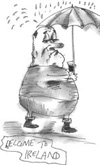
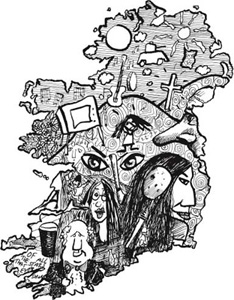
Is Shane MacGowan Still Alive? Camden Tube to Camden Lock
I came out of Camden Town tube, badly in need of a piss, and crossed the road to Barclays bank. There was just enough in there to get me through the evening – I was thankful that I’d kept the account at the little village in Suffolk where I’d worked for a while years ago. They knew I was a hopeless case but, because of that, they always made sure I could somehow get hold of money – perhaps they liked the fact that they had an impoverished London-based slob on their books rather then the usual farmers, shopkeepers, salesmen and village idiots. No, not very likely at all, it was probably just a computer error that kept giving me access to cash.
I was going to an Evan Parker gig at Dingwalls. Not my usual midweek fare, atonal improvised alto saxophone (is it anybody’s?), but I was meeting my old schoolfriend, Plendy, and Martin, a mad Welsh mate of his who worked at the BBC World Service Monitoring Centre in Reading, and who was the kind of bloke who’d make witty one-liners that referred to Anglo-Saxon poetry and Russian revolutionary film makers. You had to be on your toes with Martin all the time.
I started walking quickly in the direction of Chalk Farm, then saw a figure heading towards me at about 0.5 mph. I instinctively slowed down to get a good look at him. He was wearing a baggy, dishevelled black suit with an open-necked shirt and he looked as though just keeping upright was taking up all his energy. At one point he staggered into the road and kicked a half-full black dustbin bag, then zigzagged back onto the pavement. I tried to catch his eye as he passed me, but he was staring straight ahead, at some point in the pavement or the future which might keep him going. I turned and watched him disappear into the night, then carried on to the club.
‘Guess what?’ I said to the lads a few minutes later, as Evan Parker went ‘eeeeeaaooooo a bleedeblee doooOOOWWaaapooopopopo’.
‘What?’
‘Shane MacGowan is still alive.’
And before Martin had time to make a witty connection between ‘Rum, Sodomy and the Lash’ and Beowulf, I went to the bog.
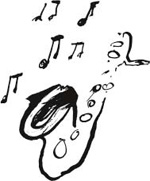
IRISH MYTHS & LEGENDS 1 How to be Irish
1 Why you Need to be Irish
Gone are the days when being English opened doors for people around the world. Now Irish is where it’s at culturally, economically, sexually and politically. The Brits have been jealous of the Irish for centuries because of their ability to drink, their nice singing voices, their straight-armed dancing style (which is so much sexier than Morris dancing) and their ginger hair.
2 Positive Affirmations
You can be Irish. You can leave behind the English world of semi-detached houses, garden gnomes and Freemasonry. It’s simple. Just repeat one or more of these simple phrases every day after getting home from the pub and in no time at all you’ll find yourself on the fringes of the Irish football squad for the next World Cup.
Every day, in every way
I’m becoming Irishyer and Irishyer
Feck me
I am Irish
England 0–Ireland 1, Euro ’88
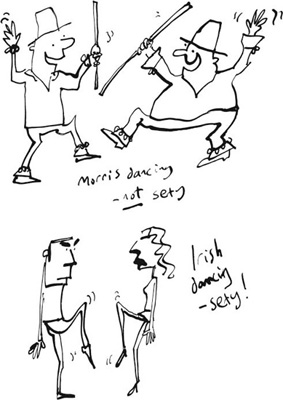
3 Diet
The way to a man’s nationality is through his stomach. The Englishman needs two vital foodstuffs to keep him going – roast beef and baked beans – while the Irishman can survive on just one, the simple potato. It is the most versatile form of nourishment on the planet and only Guinness has more vitamins and minerals and less calories.
4 Exercise
Football and darts are the national sports in England, and everyone in the country knocks a ball around in the road after work then goes down the pub, sinks fifteen pints of lager and throws little arrows at a board. It’s fun, but this regime is not great for total all-round fitness. However, there are many traditional Irish pastimes which increase strength and cardiovascular fitness, such as pub brawling, hurling, throwing the potato and that dancing where you keep your arms straight and move your feet really fast.
5 Making Friends
Irish people and English people are very similar except for slight variations in social etiquette. Without generalising too much, whereas the English are repressed, tightarsed cold fish with people they don’t know (such as their parents) Irish people will slap a stranger on the back, shout ‘How are ye?’ at the top of their voices, buy them a drink then take them home and give them a damn good seeing to.
6 Sex
Sex sells. Everyone knows this. That’s why I’ve included it in this book. The publisher will probably make sure that ‘sex’ is written on the cover somewhere in an eye-catching font, and then copies of the book will be put in the sex manuals’ section of the big shops. And those sections are always full of eager people with bulging wallets.
Sex with English people is all messy and complicated what with condoms, Femidoms, spermicidal gel, multiple orgasms (for both partners), prenuptial agreements, and the dreaded threat of kiss ’n’ tell tabloid revelations. In Ireland all these things (including multiple orgasms) are rationed by their owners, Catholic Church International Holdings plc, so people have to make their own fun.
7 Release the Leprechaun Within
English people have an inner child that has temper tantrums, plays video games and downloads pictures of famous actresses in swimwear from the internet. Irish people, in contrast, have an inner leprechaun that has a great laugh and lives in those clear plastic domes that you have to shake to make the snow fall.
8 Dye Your Hair Ginger
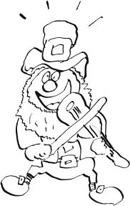
FINNEGANIALondon
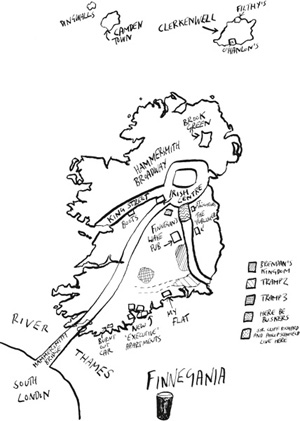
On a Clear Day You Can See Fulham Football Ground Hammersmith to Ireland (in my head)
Hammersmith was fucking cold. Ice had travelled over from Scandinavia, passed across the North Sea like a self-satisfied speed skater1 and taken the short journey along the quiet, silver river to W6, where it had formed an unhealthy union with heavy metal particles, those noxious clumps of cancer dust that float around the major capitals of the world, but particularly the Fulham Palace Road. Most people would have cheerily admitted that it was no worse than normal. If I’d talked to anyone. But I went through phrases of not talking to anyone, particularly Londoners over fifty, who would, naturally, start to bang on about ‘pea soupers’ and the 1950s and rationing and how the Kray twins were ‘lovely fellas’ really and football teams were much better in those days. They weren’t, I wanted to say, actually. Better. The football teams. I knew this and had already made up an argument for the time when I would be confronted in a dark alleyway by a gang of preposterously nostalgic and assertive football-mad cockneys. Players in the forties and fifties were just a load of unfit brickies with smoking-related breathing problems who hoofed the ball from one end of the pitch to the other.

But despite the pollution, this part of Hammersmith is a beautiful place, full of life and noise and crap buskers and spilling-over pubs and real newspaper stalls (with more Irish papers than you can get anywhere in Ireland) and half-crazed hawkers selling six lighters for a pound (‘Laydeeezz. Lighters, laydeez?’), with Charing Cross Hospital looming over everything in much the same way that St Paul’s Cathedral must have dominated the old city in the late seventeenth century. Though Charing Cross Hospital isn’t quite as attractive. The upside of this is that there are no Japanese and American tourists taking videos of themselves or asking you for the way to the ‘Tower of London, buddy’, which has to be a good thing. People – well, estate agents and puff-piece hacks in the Evening Standard – are always talking about Fulham Palace Road ‘coming up’, getting smartened out and sorted. But all that ever seems to change are the pubs, which are the only things that don’t need changing.

There is nowhere in Hammersmith, to my knowledge, that you can get away from the sound of cars. Sometimes I’ll lie in the bath with the windows of the flat open. I don’t mind the cold. I want the noise. I listen to the traffic. It reminds me of the sea. The noise, the roaring, coughing eternal circle of Hammersmith Broadway, picking up speed towards the A4 and M4. It never stops.
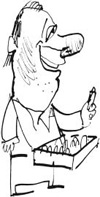
I decided to do my bit for reducing air pollution by selling the car. My girlfriend Annie had bought the Vauxhall Corsa back in 1994 when we’d lived off Portobello Road and she was working in Weybridge. Now she’d been promoted and had headed off to Houston, Texas. What did I want with a car? This was my task, the one thing she’d left in my capable hands. We’d spent a day, back in November, driving around various garages trying to get a decent price. Then I remembered a conversation I’d had with a garage mechanic in Limerick at the tail end of 1992. He’d fixed the breakpads on my brother’s rickety old Ford Fiesta for a fiver, and told us that if we wanted to sell the car we’d get £1,500 for it. We were incredulous. Bearing in mind that the pound and the punt were almost on a par, it seemed like a twenty per-cent markup at least. The thought entered my head that I could drive the Corsa over to Ireland, have a holiday, sell the car and make a good deal. I’m no businessman, but the glamour of this proposition had quite an appeal.
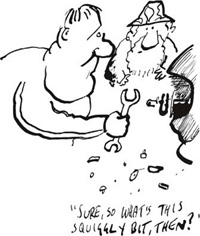
I don’t know much about cars. But I knew I needed an adventure. I had just turned 33. Thirty-three. The Lord of Lords, our Saviour Jesus Christ, had done the business by the time he was thirty-three – had a real relationship with a deity, tried to lead his people to freedom, had arguments with the leaders of an occupying army, been crucified on a big hill in front of crowds of people then reincarnated himself for his friends. I had done none of that (though there was the night of a sixth-form party in Lincoln in 1982 when, after puking most of my innards up, I recovered sufficiently inside Ritzy’s night club to the extent that some people thought it was a miracle. ‘Truly, that man is the son of God’, said some little Lincolnshire disco girl in a John Wayne accent as I forced half a pint of cider down my throat.).
I needed to get away for a while anyway because I was becoming too set in my ways. I’d even stopped my regular habit of giving money to the bedraggled figures in the subway at Hammersmith roundabout. Well, one of them. He spoke in a Yorkshire accent but he could have been Russian, rocking backwards and forwards staring at his palm. Sometimes I used to think, sorry mate I’m just too skint, but I’m not as skint as him no matter how much I’ve pissed away in a pub on Archway Road. I once had to break up a fight he was in – he was about to beat up a skinny frightened guy who was trying to steal his patch. Luckily, I had a microphone stand; I was on my way to a gig in the Tut ’n’ Shive on Upper Street – the British Country & Western revival we called it (‘Brit cunts’, said our friends), so I brandished the mike stand and told them to stop fucking about. Now I was mad at him (and really mad at myself). I was down there once with my dad and brother and was going to tell them about the incident but they were mesmerised by an appallingly drawn picture of Bob Marley that some bloke was trying to pass off as a poster to tourists on their way to see Sir Cliff in Heathcliff at the Hammersmith Apollo.



